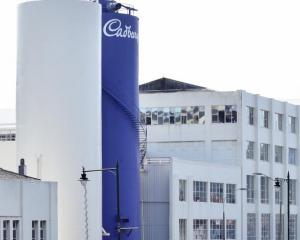The final part of Dunedin’s large-scale manufacturing is being ripped from the city following an announcement yesterday the Cadbury factory will close sometime next year.
About 350 workers will lose their jobs as Cadbury owner Mondelez International closes the operation. Mondelez is an American multinational confectionery, food, and beverage company based in Illinois which employs about 107,000 people around the world. It has annual revenue of nearly $US30billion and its shares trade at about $US45 each.
Dunedin is a mere speck on the map for this multinational company which also owns Nabisco, Lefevre-Utile, Enjoy Life Foods, J. S. Fry & Sons and Cote d’Or.
Dunedin has been through these types of downturns and redundancies before and has survived. The city will survive this time but thoughts must immediately turn to the fate of the workers, many of whom have worked at the Cadbury factory their whole lives.
When the closures started in the late 1980s, meat workers, factory workers and other semi-skilled workers did find work. There were still pockets of manufacturing in the city which absorbed them, although some people did leave the city. The demise more recently of the Fisher & Paykel Appliances factory, near Mosgiel, left many people struggling to find jobs, but again, Dunedin and Otago employers came through. By taking on one or two at a time, employers found the Fisher & Paykel workers employment locally.
Hillside workers were perhaps not so lucky. The heavy manufacturing base had dried up in Dunedin when it was decided to buy Chinese locomotives instead of encouraging their construction in Dunedin. Despite strenuous efforts, a local working party failed to stop the closure of Hillside and nothing is likely to stop the closure of the Cadbury factory.
For this closure, time is on the side of people in a position to make a difference. About 200 workers remain in employment for a year before being made redundant. The rest finish early next year. Plans can be made to re-educate and re-skill some of those workers. There is a skill shortage in Dunedin and Otago and the most optimistic of projections see at least some of the Cadbury workers being taken on somewhere in the city or region. But what about the older workers who may have spent 30 to 40 years at the factory? This is an incredibly disturbing time.
For the past 25 years or so, Cadbury has been at risk of closure and various plant managers have taken up the cudgels to keep the place open. Millions of dollars have been spent over the years on expanding operations. Cost-cutting operations have taken place in the past. It is likely the factory is profitable, but just not profitable enough for a large American conglomerate. Dunedin’s climate was promoted as being ideal for a chocolate maker. Even Mondelez acknowledged the Dunedin workers were among the best-performing teams in the region. But in the end, a multinational has again decided the future of workers in the city.
History tells us Richard Hudson set up his bakery making biscuits in Dunedin in the late 1860s. In 1884, he visited Europe where he bought a chocolate-making plant. Cadbury originally supplied New Zealand with chocolate from its factory in England, but in 1928 increased duties on imported goods forced the company to look for a local manufacturer, to remain competitive. An amalgamation in 1930 formed Cadbury Fry Hudson, building on Richard Hudson’s existing Dunedin chocolate, confectionery and biscuit business.
The vacant factory will from next year be a major reminder of what Dunedin has lost.
It is imperative any working party established to help the redundant workers is successful in finding jobs. A large number of families are making a solid contribution to the fabric of this city. They now need the city’s support.













